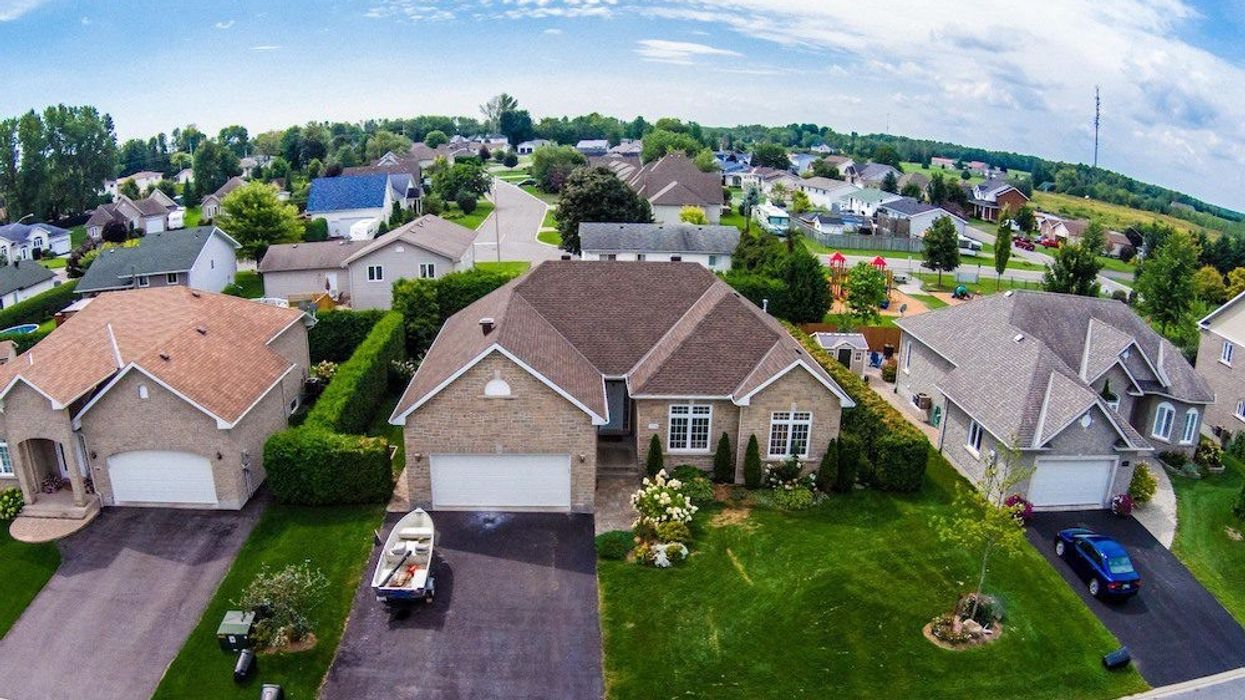Higher mortgage rates are all but promised in the near future -- but that doesn't seem to be dissuading Canadians' confidence in real estate (not to mention home prices), according to a recent survey.
New polling led by Nanos Research Group for Bloomberg News found that levels of optimism in Canada's housing market hit a record high last week as 64% of respondents said they expected the value of real estate within their neighbourhood will go up within the next six months. The findings indicate a week-over-week increase in sentiment from 60%, one of the steepest seven-day swings on record, according to Bloomberg.
READ: This is What Will Happen When the Bank of Canada Hikes Rates
Nanos, which surveys 250 Canadians weekly on their views on the economy, reports that historically, the response to that question hovers at 40%. Similar polling conducted in mid-January found that nine in 10 Canadians were less concerned about rate hikes than they were regarding overall rising real estate prices.
No End in Sight?
Such high levels of optimism are a sharp contrast to comments made last week by Canada's banking regulator head Peter Routledge, Superintendent of the Office of the Superintendent of Financial Institutions, who said he could see "trough-to-peak declines" in home prices by 10 - 20% in Canada's biggest housing markets as a result of higher borrowing costs.
He bases that hypothesis on the decreases in activity and home values experienced by the Vancouver and Toronto markets between 2015 - 2017, when the market absorbed both a series of interest rate hikes, and new demand-side policies designed to target speculative activity. However, the impact of those declines was temporary at best; strong rebounds occurred in both markets over the course of 2018 - 2019, even before the "supercharged" influence of the pandemic.
Routledge's stance has been met with a fair share of doubt that the market is actually slated for a downturn. John Pasalis, President of Realosophy Realty, told STOREYS that even should prices soften in a market like Toronto, the city's abundance of capital would mean demand would immediately pick up the slack.
"If prices fall 20%, what I can assure you is going to happen is my phone is going to be ringing off the hook from investors who want to capitalize on lower prices," he says. "Not to say that it’s not possible for prices to fall, but keep in mind, even if prices fall 20% on average, some markets might be by 30%, some markets might be 5% or 10%. And that’s just the way it works. The areas that saw the most price gains are usually the most vulnerable, right? The areas that didn’t appreciate as much, they’re less vulnerable.”
Room to Grow in the Condo Sector
Of course, the main culprit behind Canada's rapid real estate price inflation has been a steep supply-and-demand imbalance, which has fueled sellers' markets -- and multiple offer situations -- across the country, with new price benchmarks seemingly set deal by deal in the hottest neighbourhoods. The Canadian Real Estate Association reports there was just 1.6 months of active inventory available in the December market -- fewer than "any other point on record."
However, there's hope this will alleviate slightly later this year, says Claudio Castro, Agent Coach at Zoocasa Realty, who thinks the market is starting to normalize from the grip of pandemic-induced buyer urgency.
"What I believe we’re seeing is a shift in the real estate calendar; I think we’re going back to a more traditional one," he says. "I think there’s slower inventory through January and February, and we’ll see more March-April-May-June listings, which will even things out a little bit. The home prices aren’t going to go down, but at least it will level off the competition. I think July to August is going to be dead -- people will want to just go out -- and then we’ll have a traditional fall market. So I think we’ll see a correct real estate calendar -- we just haven’t seen that in two to three years.”
He adds that while low-rise home prices are quickly reaching an affordability ceiling for many -- the average low-rise house in the GTA now costs $1,741,318, according to the January data -- there's plenty of room for price acceleration in the condo sector.
"Traditionally, the condo sector is priced two times less than freehold, where right now it’s 2.5 times less," he says. "There’s a gap for condo [prices] to improve by a 0.5%, which I think, once freehold becomes unattainable, there’s going to be a shift in the market to condos again, to bring things back up to even par.”
This reflects research from the Toronto Regional Real Estate Board that finds that while detached houses are poised to remain the most in-demand home type in 2022, the share of buyers targeting higher-density home types, such as condos, is set to grow. In fact, this continued resurgence in demand could drive first-time buyer activity to higher proportions within the City of Toronto, even as this buyer group is expected to have an overall smaller presence in the market than in past years.
So, sorry to be the bearer of bad news, prospective homebuyers -- looks like rising home prices are here to stay, with or without lower mortgage rates.





















